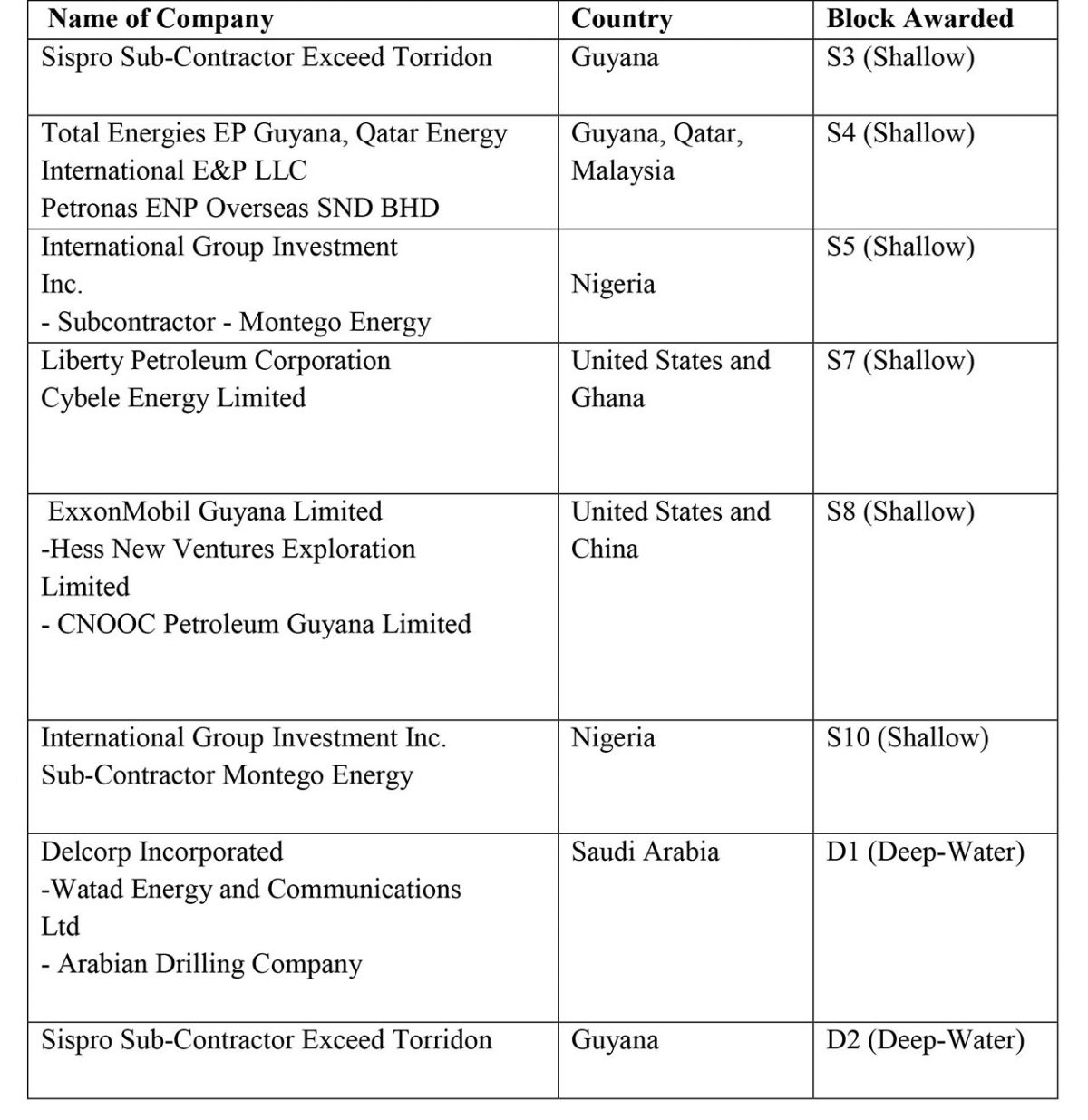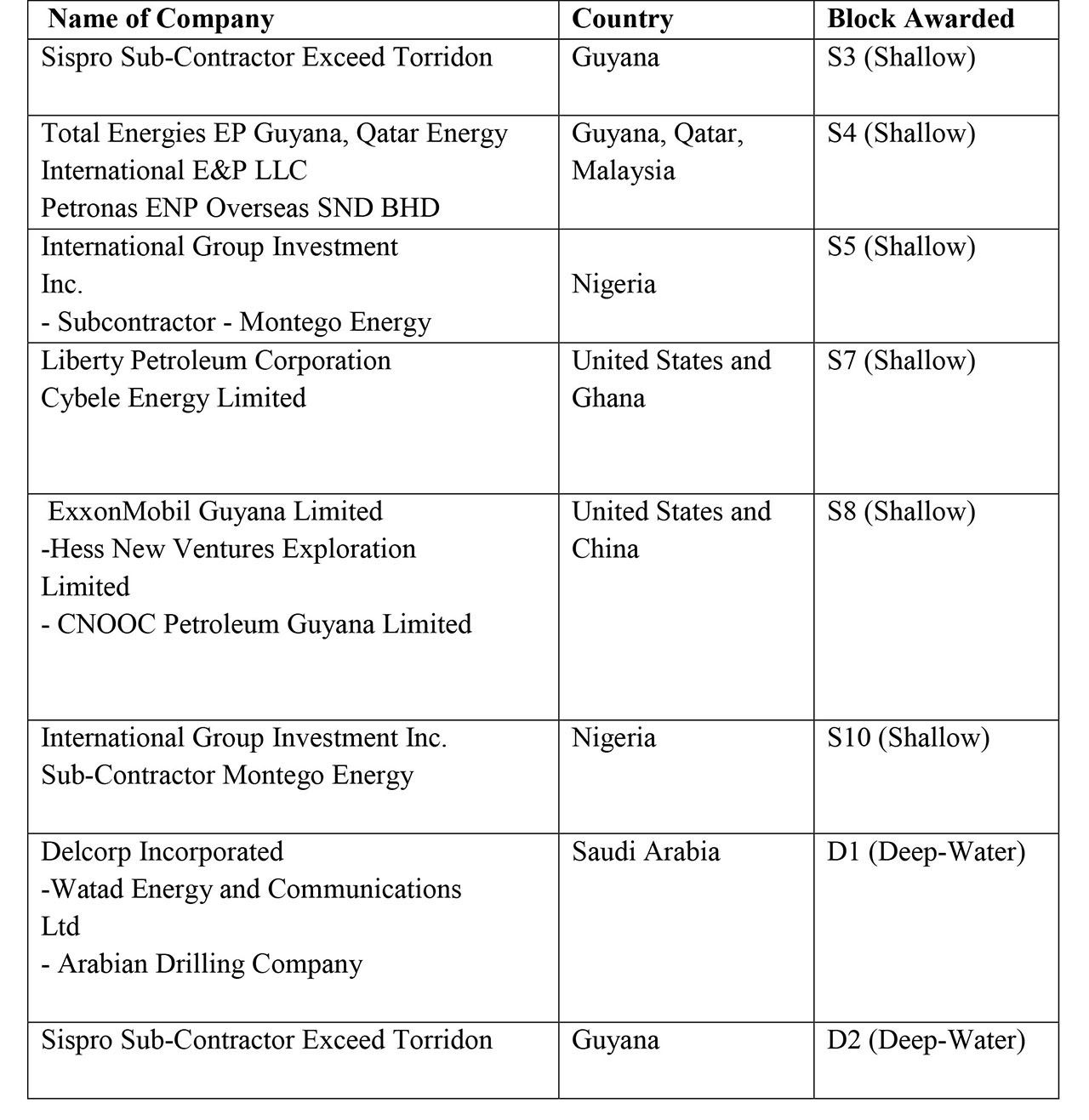All six companies that submitted bids for eight of the fourteen offshore oil blocks that were up for auction in September have won an area and will now move to stage one of negotiating terms with government.
The announcement of the allocations was made at a PPP/C press conference yesterday by party General Secretary, Vice President Bharrat Jagdeo who has oversight for the sector.
“Now that Cabinet has approved these awards, they [the companies] will now be invited in and will determine the pace at which they can move; the negotiations and the conclusions.
“Remember they would have to come and verify their plan, show sources of financing, show the ability to pay the signature bonus and all of that. They will be engaged next week,” Jagdeo said.
He explained that if one of the larger companies agrees to the draft Production Sharing Agreement, this country’s government will be ready to collect the monies and deposit it, but if another company wants time to finalise their plans, they will be given that scope. “We want to do a good job. Time is not the issue here; it is doing a good job. Ensuring the due diligence is done, getting a proper contract signed. We are not running a sprint here, so if it takes one month in some cases and three in another, providing a good job is done.
“In the discussions we will know if people are serious. If a company said we need two years, we can’t have that. So let’s have the discussions first with the companies and… then get a decision on the maximum time,” he added.
Jagdeo said that during the discussions, government’s expert consultant will be present, noting, “It will not be a Trotman affair,” making reference to APNU+AFC Minister of Natural Resources Raphael Trotman who was the signatory to the controversial 2016 PSA with ExxonMobil and partners in the Stabroek Block.
The table below shows the name of the company and the block awarded.
Meanwhile, Jagdeo hailed SISPRO which is made up of local women, saying that it is admirable that they took the risk and invested in the bidding. “This is a very risky sector and I’m extremely pleased that the locals have been able to organise themselves to work with some foreign companies and put in the bids”, he said.
The company is chaired by Dr. Melissa Varswyk with other partners being, Secretary and Executive Director, Abbigale Loncke-Watson; Executive Director, Ayodele Dalgety-Dean; and Executive Director, Dee George.
Since the announcement of the six bidders for eight blocks in mid-September, government has said that it was not disappointed in the low number of companies submitting interests.
And given the current global investment climate for petroleum projects where other countries have not had the feedback they desired, President Irfaan Ali has said that Guyana was grateful for the bids placed and will try to maximise the potential opportunities to develop its resources.
“First of all, it is not a disappointment at all. This market, let us be very open and factual about this, we went out to auction at a time when major economies in the world are basically saying to oil producers, we are not going to finance you. You are going to a market where capital is an issue. Many countries went to this same market and got no response for their auction,” the President had said as he fielded questions at a forum organised by the Washington DC-based Inter-American Dialogue (IAD) back in September where he discussed his administration’s views on opportunities and challenges in US-Guyana relations.
Various senior government officials had talked up the prospects of the offshore blocks but the deadline passed and only eight bids, including from French oil company Total were entered. Noticeably absent were any bids from India or Indian companies.
Observers had said that given the adjusted terms of the PSA (Production Sharing Agreement) which were far more beneficial to Guyana than the one ExxonMobil sealed in 2016, there would not likely be many bidders. This was particularly so given the increasing shift away from carbon fuels and the projections that in a decade or so, demand would fall substantially. Bidders face a probable 15-year timeline between exploration and possible production with no guarantee that light crude would be found.
“We went to this market for fourteen blocks and we got response for eight blocks. We are very happy. That is significant and cannot be minimised in any way, shape, or form, because many countries went out and got no attraction,” the President had said.
“If you follow what we are doing, you would know that many countries have expressed a preference for government-to-government exploration and relationship on this issue. India would have expressed a willingness to work government-to-government, Qatar would have expressed an interest in working government-to-government, and the DR [Dominican Republic] has also expressed that interest. So that option is also there. But what we said is, we must put all the blocks out there and have a public process. An open transparent, public process and that is what we are proud of,” he added.
The President said that Guyana has been able, as a newcomer in the petroleum producing business, “to demonstrate transparency and openness in putting out the blocks for public auction.”
And in doing so, Ali said that the process saw global oil major bidding. “What we have seen is a number of major companies. What you have seen is the consortiums, is a number of companies that have the wherewithal to be part of the auction. You ask how disappointed I am, I am not disappointed. I think this is a tremendous accomplishment given circumstances and the market we are operating in,” he added.
Pointing to the Inter-American Development Bank loan for the GYSBI shorebase that had been vetoed by the Joe Biden administration, Ali said that Guyana has much to be grateful for.
“We have the experience of having one loan vetoed already because it was being associated with the oil sector,” he emphasised.
And against the background of developing countries’ anti-fossil stance, Ali said that Guyana will make its position known on the issue at the upcoming COP 28 meeting. In a world that sees projections of fossils being part of the energy mix more than 50 years from now and with over 50% of the world’s current energy coming from petroleum, Ali said that “questions will be asked at COP28.”
Yesterday, Jagdeo emphasised that while persons will say the current PSA terms are harsh and make proposals for altering it, “if the demands are extreme, then we will simply not proceed with that.”






